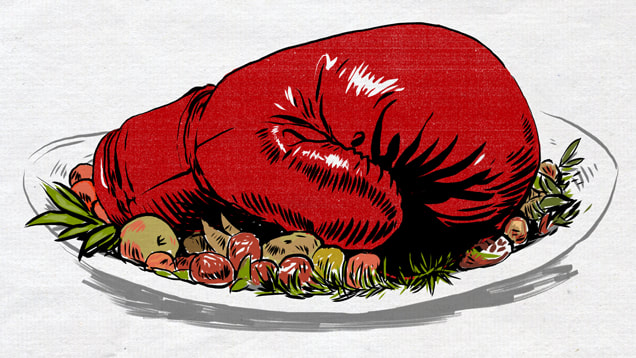|
It appears our nation’s divisiveness has spread well beyond water-cooler banter and coffee-shop talk, encroaching upon the sanctity of our traditions— the holiday get together.
For many people in my generation, the holidays were once a time when family set aside their differences in the spirit of the season. We avoided discussing topics that could spark family feuds. It was the Zeitgeist of the Walton family. A time when the unspoken rule to leave your baggage at the door prevailed. Yet this tradition may now be waning due to increasing intra-family discord emanating from the political strife which has divided our nation. Regardless of political persuasion, many Americans feel compelled to voice their dissent -- be it on the streets at a protest rally or in grandma’s kitchen on Thanksgiving day. If you consider the family as a microcosm of society, then it’s understandable to see why the nation’s angst is spilling over into our homes. Family members with polarized socio-political views are squaring off. This has pitted in-laws against in-laws, cousins against cousins, brothers against sisters, and wives against husbands. As a therapist, I have seen families torn apart due to the political dissension. Americans are passionate about the future direction of our nation, so it’s not out of the realm of possibilities for family bickering to escalate into a scuffle. “What do you mean Trump is…,” as granny grabs the bird and slings it across the table. So what can you do to prevent a flying Mr. Butterball? What is the best tactic to use if you find yourself at a holiday party and a relative wants to incite a futile political debate? I asked around and got some suggestions. My cousin said to “try to win them over, prove your point with facts.” Call me crazy, but I think it is very difficult--if not impossible--to change a person’s beliefs at one dinner party. “Yeah, as I was saying about gun control--oh, can you pass the yams.” A friend of mine goes for the avoidance approach. “I can’t stop him from going on about his politics, but I can seat him at the kid’s table.” My dad goes for the change-the-subject tactic. When asked by his sister if he has heard the latest fake news, my dad responded: “Yeah, I watched TV. How about those Astros.” Whether you see the world through a lens of blue, red or somewhere in between, it’s helpful to remember that our political leanings are influenced by the values we have developed over a lifetime. People can and do change, but it is usually a process that takes time.
1 Comment
 In this final article on bullying, I explore how advocacy can thwart bullying and explain how a business is doing just that. I have witnessed bullying take its toll on the psyche of our youth. The juveniles I have counseled would tell me how “low” they felt when being bullied. Yet I didn’t realize there are long-term health consequences associated with bullying, until I learned these facts:
Though the media have covered childhood peer bullying extensively, adult-on-youth bullying is equally harmful and may be underreported. Youth may heed the code of silence if the adult bully is in an authoritarian position and has the power to retaliate. Adults who care about youth have a responsibility to stop the abuse. Michigan State University has studied this problem and recommends these steps:
Sometimes the strongest advocates are people who have been bullied themselves, like Shannon Rapose, who works in Lake Isabella at The Pizza Factory owned by her family. Rapose was bullied in her youth by a group of classmates who incessantly taunted her and threw green, spiky tree pods in her hair. Rapose reported the incidents to her mother, who advocated on her daughter’s behalf and worked with school officials to stop the bullying. Paying this advocacy forward, Rapose channeled this experience into something positive, and subsequently established the Pizza Factory as a safe/no-bully zone — a place that welcomes all regardless of cultural affiliation, age, race or sexual orientation. Rapose recently painted a rainbow, no-bully sign on the window, yet it was defaced within one week. “I was surprised the sign lasted that long,” Rapose said. “There are always risks involved when you are promoting tolerance.” Despite these risks, Rapose continues to be an advocate. For instance, a group of men recently visited the restaurant, and a young waiter asked the group if they needed anything else from the kitchen. One of the men looked at the waiter’s rainbow wristband and snarled back, “no we don’t need anything from you [expletive].” The employee reported the incident a day later and Rapose responded by ordering rainbow bracelets for any employee who wanted to show their solidarity with the waiter. This action effectively showed the employee that harassment is not ok, and people will take a stand to prevent it. I wonder how such nurturing could change the lives of young people who are bullied. Would youth be less apt to develop mental health symptoms because they learned that the world is not all dark? Would it change their lives if they felt compassion during that moment of feeling low? Taking a stand on bullying is not always a Piz-za cake. Yet it may prevent youth from suffering long-term mental health problems associated with bullying. What is your experience in standing up for youth? What are there barriers that make it difficult to take a stand? Share your comments below. Note: This is the full article of a condensed version that was first published in the Kern River Courier. When I first became a therapist, I stayed in the traditional lane of my field, affecting change one session, one person at a time. This is the conventional route, and I may have indeed followed this path if I did not meet a new breed of counselor I call the "macro therapist."
Macro therapists extend their reach and impact by getting involved in community non-profits, raising awareness of mental health issues and serving as social justice advocates when clients are harmed by the very system designed to help them. I am proud to be in the company of these mental health leaders, as they have successfully demonstrated (and taught me) how to navigate the intersection of psychotherapy and social justice. These leaders continue to inspire me and work with me on creating ways to reflect what is truly happening in our mental health system so that change is not only created on a micro level with clients, but on a macro level with the larger society. Let me know your thoughts about therapists expanding their reach beyond traditional therapy. |
AuthorMarsinah Ramirez Buchan, Licensed Psychotherapist Categories
All
Archives
September 2023
|

 RSS Feed
RSS Feed